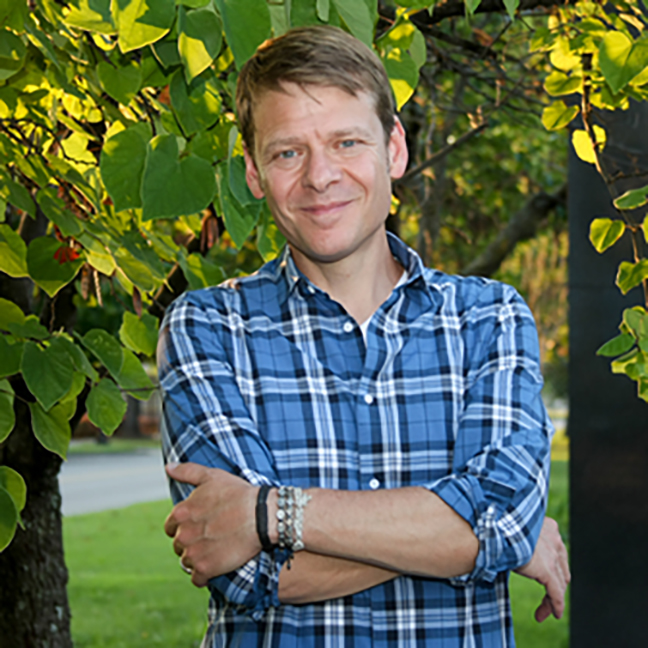Meet the EQSaints Team – Robert Feduccia

Over the next several weeks, we’ll be introducing you to the members of the EQSaints team who are working to bring our new resources to life.
First up is the Vice President of Equipping the Saints, Robert Feduccia. You can check out Robert’s full bio on our Who We Are page, but Robert also took the time to answer a few of our questions about why he does this work and what he sees for the future of the organization.
Robert, why do you choose to work in youth ministry?
Very simply, I had a great experience of youth ministry during my teen years. I grew up in Mississippi where there are few Catholics. But the Diocese of Jackson did a great job of connecting Catholic teens to one another. We loved to get together. We enjoyed each other’s company, but even more than that it was a community where I could be myself. I loved the community that the diocese fostered, and I wanted to be a part of recreating that experience for others.
When did you know you wanted to be a youth minister?
I think I can trace it back to two retreats. The first was in my junior year when I was part of a retreat program called Search. Then in my senior year, the National Evangelization Teams lead a retreat for us in the diocese. They both had a lasting impact on my life and made me think about being a diocesan director of youth ministry. Oddly though, that is the one job in youth ministry that I have not had! I just realized that when you asked that question!
What experience most prepared you for the work you do today with young people?
After I left my position as a parish youth minister, I went to Saint Meinrad Seminary and School of Theology. While I was there, we turned a fledgling youth leadership conference into a real forward-thinking conference that engaged young people in liturgical leadership. Developing that conference caused me to think much more strategically than I had in the past. As I immersed myself in the liturgy, I saw that the conference was telling the story of the liturgy. The liturgy itself created a framework, a narrative, a story that was being told. There is a symmetry to the liturgy. I began to look for that symmetry in other places. Scripture for example isn’t just a collection of instructions. It is literature. The authors used clever and nuanced literary devices to tell the story. Even Paul’s letters contain a story arc. Whether it is crafting a script for the National Catholic Youth Conference or writing a Bible study for a small group, there is a narrative. A story is being told. If I can go off on a tangent for a moment, the story of Jesus has been called the “greatest story ever told”. Honestly, I have found that to be a bit cheesy. But every time the story of Jesus is presented, I’m captured. If I’m reading the gospels, something takes over at the Passion. I just lose myself in the story. If I’m watching “Jesus Christ Superstar” or “The Cotton Patch Gospel”, I’m completely engrossed. This is the Christian narrative of life, suffering, death, and the ultimate victory in the resurrection and it is always compelling. Presenting this story to a new generation with all of its impact is what I see as my ministry. Without the time at Saint Meinrad that required us to craft an overall narrative and then to craft the granular experience of a small group discussion that fits into the whole, I don’t think I would be able to do the work that I am doing today.
What’s your favorite memory of working with young people?
I loved working with the teens that were on my leadership teams when I was in the parish. The laughs, the tears, the honest conversations, the times of prayer: all of these, when taken as a whole were phenomenal.
If I were to take a singular moment, however, it would be a moment during the reconciliation service at a recent youth conference. Earlier in the conference, a young lady told me about something that she was going through. The look on her face, the tone in her voice, the language she was using all pointed to despair. She didn’t like what was going on in her life and she couldn’t see a way out. Then, during the reconciliation service, I was reading my Bible. I don’t know what lead me to the story of Jesus’s healing of the little girl who was believed to be dead, but I sat with that story and prayed through it. Out of the blue, the thought came to me that this passage was for that particular young lady. I went over to her with my Bible in hand and asked her to just listen to the story. It tells of the people surrounding her who were saying she is dead. But Jesus tells them that she is not dead. She’s only sleeping. Jesus then goes into her room; he extends his hand to her and says, “Little girl. Get up.” Then she gets up. I closed my Bible and I said to her, “You are not dead. You are only sleeping. Jesus is extending his hand to you in the sacrament tonight. Go to him and hear him as he asks for you to arise.” At this point, I’m weeping. She’s weeping. She goes to confession and experiences the Lord’s healing. It is a simple moment, but I hold on to that as symbol of what youth ministry is all about. It is seeing what God is already doing in someone and simply helping them to say “yes”.
What makes you excited about the future of our church?
We did an exercise when we were in the middle of strategic planning for our future. It was an exercise where we did an analysis of societal history over the course of the last hundred years. We analyzed the development of technology and social trends in each decade. It was huge. I mean physically. It was huge. Floor to ceiling it covered a wall in a multipurpose room. That exercise ultimately revealed that humans have been on a trajectory of mass customization. The Second Vatican Council was actually way ahead of its time on this. The Council shifted the locus of theological language from the language of “human nature” to the language of the “human person”. That’s what excites me about the future. It is the attention to the person, not to a mass of people. Don’t get me wrong. I love the large events. The National Catholic Youth Conference and events like that are essential in the Church. Truly, they’re essential. I would love to pack an arena filled with teens and preach my heart out to them. But our day-in and day-out ministry is keeping the individual young person in mind. That means that adults must be better equipped. In the earliest part of our history, Christianity spread and reached a critical mass because individuals of fervor and conviction were in relationship with people who were searching for something more and something better. That has always been the way people have come to know the Lord. I think the Church is recognizing that and is being intentional about that. It is the story and experience of one person that speaks to the story and experience of another. Having the average Catholic in the pew understand that and be equipped for that dynamic? That’s what excites me about the future.
Which of the changes coming at EQSaints are you most excited about?
I really am excited about Equipped for Life, our new framework for guiding young Catholics on the path to discipleship. I believe in the overall process of forming disciples in this way and I believe that we are putting in place a very effective tool for parish leaders. Yet, a program or a process is only as effective as the leader. Because of that, the title of our ministry is what excites me most. Ephesians 4 says that the Lord sends out gifts in order to equip the saints, the holy people of God, for the work of ministry. The training of paid leaders, the training of the volunteer who wants to make a difference in the lives of young people: this is what gets me excited about what we are doing.
What’s one piece of advice you’d offer youth ministers today?
Practice, practice, practice accompaniment. OK. I know that is an overused buzz word in the Church. But buzz words contain truth that is difficult to explain and they provide a succinct way of expressing that truth. In the past we have used the stuffy phrase of theological reflection. One particular model of theological reflection has the following steps: 1) attentive listening 2) reflecting 3) responding 4) integration 5) resolve. These steps are just trying to name two things. First, know God. Know his Word. Know how he moves in you. Know how he works. Know what he says and how he says what he says. Then love and listen to the teen. Hear them. Understand them. Practice actively listening. Reflecting is a second step. So many times we think about what we want to say and we miss what is being said by the other person. Ask questions with a curious and joyful heart. Then you can respond with scripture or with the way that God has moved in your life. Invite the integration that comes from dialogue. Finally, where do you both go from here? So many academic names have been given to this: pastoral imagination, theological reflection, accompaniment. But this is the way a minister lives in the world. Know the Word. Know your people. Speak prophetically.
What is your idea of a great youth group session?
It’s not the in the games. It’s not in the talk. It’s not even in the small group time. It’s in the prayer time. God does the work and it is in prayer that we absorb something into our being. A great youth group session is when the teens sincerely pray and don’t just endure the prayer time.
What’s your favorite Bible verse?
2 Corinthians 5:17-19
17 So whoever is in Christ is a new creation: the old things have passed away; behold, new things have come. 18 And all this is from God, who has reconciled us to himself through Christ and given us the ministry of reconciliation, 19 namely, God was reconciling the world to himself in Christ, not counting their trespasses against them and entrusting to us the message of reconciliation.
Who is your favorite saint? Why?
St. Oscar Romero.
I honestly think he was the most godly person from the 20th century. He preached. He lived humbly. He lived for others. He heroically imitated Christ.
What parts of church life are you most looking forward to when the pandemic passes?
Awkward side hugs, of course!

